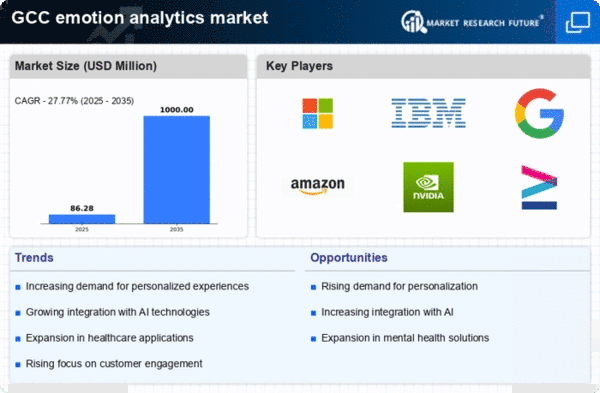Rising Demand for Personalized Marketing
The increasing emphasis on personalized marketing strategies is driving the growth of the emotion analytics market. Businesses in the GCC are recognizing the importance of understanding consumer emotions to tailor their marketing efforts effectively. By leveraging emotion analytics, companies can analyze customer sentiments and preferences, leading to more targeted campaigns. This trend is particularly evident in sectors such as retail and hospitality, where emotional engagement can significantly influence purchasing decisions. According to recent data, the GCC region is expected to witness a growth rate of approximately 25% in the adoption of emotion analytics tools by 2026, as organizations strive to enhance customer satisfaction and loyalty through personalized experiences.
Growing Importance of Employee Engagement
The focus on employee engagement is becoming a crucial driver for the emotion analytics market. Companies in the GCC are increasingly recognizing that understanding employee emotions can lead to improved workplace satisfaction and productivity. By utilizing emotion analytics, organizations can gauge employee sentiments and address concerns proactively. This trend is particularly relevant in sectors such as education and healthcare, where employee well-being directly impacts service quality. The market for emotion analytics tools aimed at enhancing employee engagement is expected to grow by 20% by 2026, as businesses seek to create a more positive work environment and reduce turnover rates.
Advancements in Data Processing Technologies
Technological advancements in data processing are significantly impacting the emotion analytics market. The emergence of sophisticated algorithms and machine learning techniques enables businesses to analyze vast amounts of emotional data efficiently. In the GCC, organizations are increasingly investing in these technologies to gain insights into consumer behavior and preferences. This trend is likely to enhance the accuracy of emotion detection, allowing companies to respond more effectively to customer needs. As a result, the market for emotion analytics tools is projected to grow by 30% in the next few years, driven by the demand for real-time insights and improved decision-making capabilities.
Regulatory Support for Data Privacy and Ethics
Regulatory support for data privacy and ethical considerations is influencing the emotion analytics market. In the GCC, governments are increasingly implementing regulations that promote responsible data usage, which impacts how businesses collect and analyze emotional data. Companies are now more focused on ensuring compliance with these regulations while leveraging emotion analytics to gain insights. This shift is likely to foster trust among consumers, encouraging them to share their emotional data. As a result, the market for emotion analytics tools that adhere to ethical standards is projected to grow by 15% in the coming years, as organizations seek to balance innovation with consumer protection.
Increased Investment in Customer Experience Solutions
The rising investment in customer experience solutions is a key driver for the emotion analytics market. Businesses in the GCC are prioritizing customer experience as a differentiator in a competitive landscape. By employing emotion analytics, companies can better understand customer emotions during interactions, leading to improved service delivery. This trend is particularly pronounced in the banking and telecommunications sectors, where customer satisfaction is paramount. Recent estimates suggest that the market for emotion analytics in customer experience applications could reach $500 million by 2027, reflecting the growing recognition of the value of emotional insights in enhancing customer loyalty.
















